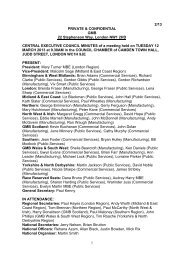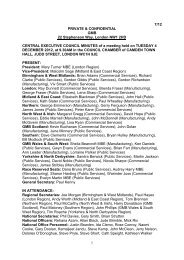WO toolkit 2012 complete.pdf - GMB
WO toolkit 2012 complete.pdf - GMB
WO toolkit 2012 complete.pdf - GMB
Create successful ePaper yourself
Turn your PDF publications into a flip-book with our unique Google optimized e-Paper software.
SECTION 5.12<br />
12. How long can an employer keep me on a temporary contract?<br />
On 1 October 2002 the Fixed- Term Employees(Prevention of Less Favourable Treatment)Regulations<br />
came into force.They implement a 1999 European Union Directive aimed at controlling the misuse of<br />
fixed-term contracts.<br />
• Fixed-term employees now have the right not to be treated less favourably or suffer any other<br />
detriment in comparison with a permanent employee in pay and other conditions,unless the<br />
employer can objectively justify it.<br />
• The Regulations only cover those who legally qualify as employees,not the wider legal definition of<br />
worker.So,some temporary workers may be excluded.Agency workers are also excluded.<br />
• The Regulations say that where an employee has been employed on a contract,or a series of<br />
contracts without gaps,for four years or more,any further extension will automatically make the<br />
contract permanent,unless the employer can objectively justify the extension.The start date for<br />
this provision is 10 July 2002,so any time on a contract or contracts before this does not count.<br />
• Employers are required to inform fixed-term employees of permanent vacancies.<br />
• Redundancy Waiver Clauses,which allow an employee to sign away rights to a redundancy payment<br />
at the end of the fixed-term contract are abolished for all contracts signed on or after 1 October<br />
2002.However,Redundancy Waiver Clauses signed before this date will still be valid.<br />
REMEMBER: there may be more than one person affected by this issue.<br />
Consider calling a meeting to advise,recruit and organise.

















